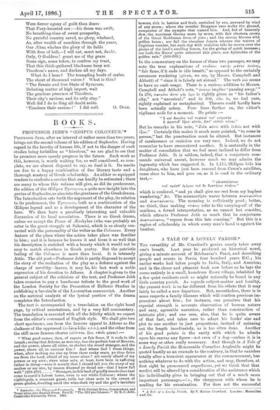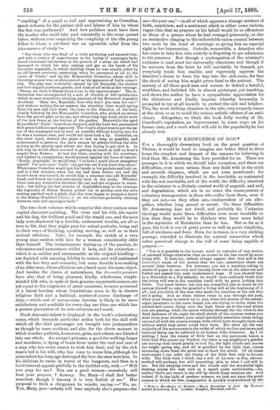A TALE OF A LONELY PARISH.*
THE versatility of Mr. Crawford's genius nearly takes away one's breath. Last year he produced an historical novel, giving a minute account of Belshazzar's Feast, and describing people and events in Persia four hundred years B.C.; his earlier works had taken people to India, Italy, and America; and in the clever and pleasant book now before us he lays the scene entirely in a small, humdrum Essex village, inhabited by a few quiet residents such as might naturally be found in any little country parish. As regards subject-matter and looality, the present work is so far different from his others that it may fairly be called a new departure. But, nevertheless, there is in some respects a family likeness which will confirm previous im- pressions about him ; for instance, one perceives that his especial strength is accurate observation of human nature and easy, agreeable narration, rather than construction of intricate plot ; and one sees, also, that he is quite aware of that fact, and takes care to adapt his books' size and plot to one another in just proportions, instead of spinning out the length inordinately, as is too often done. Another of his good points is the rarity with which he admits upon his canvas any figure—not even of a dog—unless it is in some way or other really necessary. And though in A Tale of a Lonely Parish the Hononrable Cornelius Angleside might be quoted hastily as an example to the contrary, in that he vanishes totally after a transient appearance at the commencement, has nothing whatever to do with the action, and may, therefore, at first sight be pronounced superfluous, yet we think that that verdict will be altered by a consideration of the assistance which his individuality gives in bringing out that of a much more important personage,—i.e., the clergyman with whom he is reading for his examination. For does not the successful
• A Tale of a Lonely Parish. By F. Marlon Crawford. London : Macmillan and Co.
" coaching " of a pupil so dull and unpromising as Cornelius, speak volumes for the patient skill and labour of him by whom the feat was performed ? And how guileless must have been the teacher who could take part repeatedly in the scene quoted below, without ever suspecting the complicity of the idle young fellow to whom a cat-hunt was an agreeable relief from the
irksomeness of study !—
" The vicar, who was fond of a little gardening and amused him- self with a variety of experiments in the laying of asparagus beds, found occasional excitement in the pursuit of a stray cat which had managed to climb his wire netting and get at the heads of his favourite vegetable, in which thrilling chase he was usually aided by an old brown retriever, answering, when he answered at all, to the name of Carlo,' and by the Honourable Cornelius, whose skill in throwing stones was as phenomenal as his ignorance of Latin quanti- ties. The play was invariably opened by old Reynolds, the ancient and bow-legged gardener, groom, and man-of-all-work at the vicarage. ' Please, sir, there's Simon Gunn's cat in the sparrer-grass.' The in- formation was accompanied by a sort of chuckle of evil satisfaction which at once roused the sleeping passions of the Reverend Augustin Ambrose. Dear me, Reynolds, then why don't you turn her out ?' and without waiting for an answer, the excellent vicar would spring from his seat and rush down the lawn in the direction of the beds, closely followed by the Honourable Cornelius, who picked up stones from the gravel path as he ran, and whose long legs made short work of the iron fence at the bottom of the garden. Meanwhile the aged Reynolds let Carlo' loose from the yard, and the hunt was prosecuted with great boldness and ingenuity. The vicar's object was to get the cat out of the asparagus bed as soon as possible without hurting her, for he was a humane man, and would not have hurt a fly. Cornelius, on the other hand, desired the game to last as long as possible, and endeavoured to prevent the cat's escape by always bitting the wire netting at the precise spot where she was trying to get over it. In this way he would often succeed in getting as much as half an hour's respite from Horace. At last the vicar, panting with his exertions, and bathed in perspiration, would protest against the form of assault.
Really, Angleside,' he would say, I believe I could throw straighter myself. I'm quite sure Carlo' can get her out if you leave him alone.' Whereupon Cornelius would put his hands in his pockets and look on, and in a few minutes, when the cat had been driven out and the vicar's back was turned, he would slip a sixpence into old Reynolds' hand, and follow his tutor reluctantly back to the study. Whether there was any connection between the cat and the sixpence is uncer- tain ; but during the last months of Angleside's stay at the vicarage the ingenuity of Simon Gnnn's yellow cat in getting over the wire netting reached such a pitch, that the vicar began to prepare a letter to the Bishop Stortford Chroni-le on the relations generally existing between cats and asparagus beds."
The two short volumes which comprise this story contain some
capital character-painting. The vicar and his wife, the squire and his dog, the brilliant pupil and the stupid one, and the poor lady over-shadowed by a terrible, undeserved trouble, are all so true to life, that they might pass for actual portraits, being real in their ways of thinking, speaking, moving, as well as in their mutual relations. Take, for example, the sketch of a very young man smitten with love for a woman considerably older than himself. The instantaneous flaring-up of the passion, its
vehemence and earnestness whilst it lasts, and its extinction— which is as sudden and unreasonable as the original kindling—
are depicted with amusing fidelity to nature, and well contrasted with the less fiery and romantic, but more durable love-making
of an older man, whose affections are placed upon the same object. And besides the charm of naturalness, the dramatis personae have also that of being pleasant, kindly, wholesome, simple-
minded folk who, in spite of their genuine unpretentiousness, are yet equal to the exigencies of great occasions, because possessed of a latent heroism whose foundations seem to lie in sincere religions faith and a habitual, matter-of-course discharge of duty,—which sort of unconscious heroism is likely to be more satisfactory and available for every-day use than one which has a greater perception of its own existence and merit.
Much dramatic talent is displayed in the book's culminating scene, which demands particular notice both for the skill with which all the chief personages are brought into juxtaposition as though by mere accident, and also for the clever manner in which touches pathetic, humorous, grim, and solemn are blended into one whole. An escaped prisoner, a good-for-nothing forger and murderer, is dying of brain-fever under the roof and care of a man who has every reason to wish him dead, and by the sick man's bed is his wife, who has come to nurse him, although his misconduct has long ago destroyed the love she once bore him. In his delirium he raves in terror of the hangman, and then in a lucid interval appeals pitifully to the faithful wife, with :—" Will you pray for me ? You are a good woman—somebody will hear your prayers, I daresay. Do, Mary—I shall feel better somehow, though I daresay it is very foolish of me." Her proposal to fetch a clergyman he rejects, saying :—" No, no. You, Mary, you—nobody will bear anybody else's prayers—for me—for poor me,"—in all of which appears a strange mixture of faith, scepticism, and a sentiment which is either some curious, vague idea that no prayers on his behalf would be so efficacious as those of a person whom he had wronged grievously, or else an instinctive clinging to the indissoluble union created between two souls by the bond of marriage as giving him an especial right to her intercession. Outside, meanwhile, a detective who has come to take him into custody is disputing to get admission to his presence. But though a prolongation of the criminal's existence is (and must be) universally obnoxious, and though if he recovers from the fever he will inevitably be hanged, yet everybody tends him readily, and vigorously opposes the detective's desire to force his way into the sick-room, for fear the shock of seeing him might prove fatal to the patient. The anxiety of all these good men and women to defend a hateful, worthless, and forfeited life is almost grotesque, yet touching, and shows the author to have a sympathetic appreciation for the chivalrous and kindly impulse whereby humanity is prompted to try at all hazards to protect the sick and helpless. This, the most striking situation in the tale, very properly comes at the close, so as to avoid the serious artistic offence of an anti- climax. Altogether, we think the book fully worthy of Mr. Crawford's reputation, an improvement in some ways on his former ones, and a work which will add to the popularity he has already won.



































 Previous page
Previous page